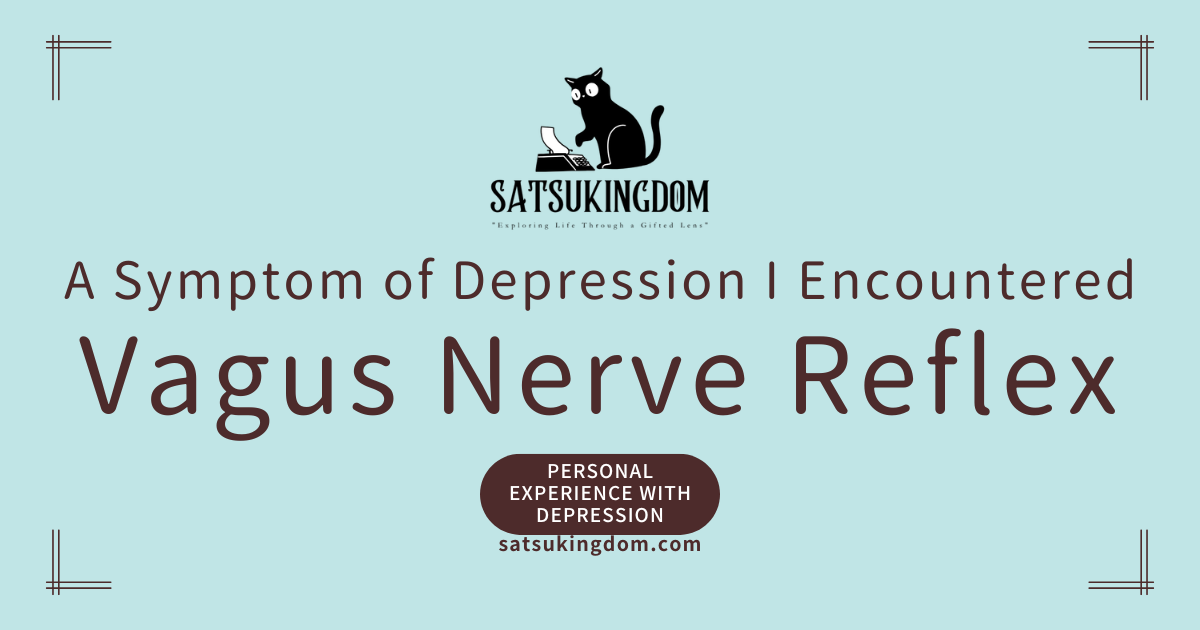This time, I’ll be talking about the “vagal nerve reflex” that tormented me during my battle with depression.
This story is my personal experience battling severe depression for three years. There is no falsehood or exaggeration, but unfortunately, I lack medical expertise.
There is no medical evidence to support this, so please consult your doctor as needed.
Anyway, the bathroom is far away.
After being diagnosed with severe depression, I took a leave of absence from work and slept constantly.
There were frequent days when I slept about 20 hours, yet I never felt rested. I couldn’t even tell if I was awake or asleep.
Even when I’m asleep, my mind is constantly churning away uselessly, and my body isn’t truly resting either. Proof of this is that I feel the urge to go to the bathroom just as often as when I’m awake.
The house I lived in back then was only about thirty steps from the bed to the toilet, but by the time I reached it, I was out of breath. I think my normal breathing had become shallow. I walked along the wall, supporting myself with my hands. Was it because I was sleeping too much, or the medicine, or the illness? My sense of balance was off, and I was unsteady on my feet. My vision was like footage shot with a camera lacking image stabilization. Taking each step was an effort. When walking where no wall was nearby, I had to spread my arms wide to balance myself, like walking across a balance beam.
Collapsing in the toilet
And finally I make it to the toilet, but I collapse once or twice a week. Not because I trip, but more like I feel faint.
This is apparently called the vagus nerve reflex.
- Vagal Reflex
A physiological phenomenon where the vagus nerve, part of the parasympathetic nervous system, overreacts to stimuli such as stress, pain, or defecation, causing a drop in blood pressure and a decrease in pulse rate. This reaction can temporarily reduce blood flow to the brain, potentially leading to symptoms like dizziness, nausea, or fainting.
In my case, while I’m using the toilet or right after, the blood drains from my head. Cold sweat pours out, and everything goes completely white before my eyes.
The first time it happened, I collapsed right on the floor of the hallway just outside the toilet. I was terrified I might lose consciousness right there. Everything went completely white before my eyes, and my hands and feet went numb and wouldn’t move. Beads of cold sweat dripped onto the floor with a steady patter.
There was a door between the living room and the hallway, so my wife had no way of knowing. With no sign of recovery, there was nothing I could do. Using my barely moving fingers, I kept tapping the floor to make noise, and eventually my wife noticed and rushed over.
My wife was startled and tried to call an ambulance, but since I’d fainted from anemia before, I suggested we wait a little longer. She looked worried as she kept wiping my sweat with a towel. I must have lain there for about thirty minutes. Finally, I was able to sit up and, leaning on my wife’s shoulder, made it back to bed.
When I consulted my doctor at my next hospital appointment, they said it might be a vagal reflex. It seems to occur more easily when the autonomic nervous system is out of balance. They advised that resting for a while usually helps it settle down, so I should be careful not to injure myself when I fall.
In my case too, once I collapse, I can’t move for about 30 minutes, but if I just leave it alone, I calm down. It was scary at first, but as it happened repeatedly, I learned to just stare at the ceiling with my dazed mind and wait it out.
Even while working, I’d get vagus nerve reflexes, but I’d sit on the toilet seat and wait for it to pass, thinking I couldn’t inconvenience others. Apparently, people were gossiping behind my back about me “never coming back from the toilet.” Looking back now, both me and everyone around me were crazy.
I caused trouble for my wife as well.
After that, whenever I went to the toilet, my wife would always casually come check on me. And whenever I had a vagus nerve reflex and crawled out of the toilet, she’d rush over immediately. It was really tough because there were no warning signs about when it would happen. It even happened once when we were at my wife’s parents’ house, which worried them.
Whenever I went out to places like the hospital, she always accompanied me and worried about me.
“Because you never know when you might collapse,” she’d say.
I can never thank my wife enough for always being by my side.
Life Check
My wife would sometimes bring her ear close to my face even when I was asleep. Then she’d whisper softly, “You’re alive. Thank goodness,” and return to the living room. My sleep is light, so I notice, but I’m not awake enough to respond. Feeling sorry for making her do that, I drift back to sleep. Later, I heard she’d sometimes worry I might be dead because my complexion was poor and my breathing shallow.
I am recovering.
As my depression improved, the frequency of vagal reflex episodes also decreased. They continued for a little over two years after that, but for the past six months or so, they have almost completely stopped.
Depression is also, in part, a battle against autonomic nervous system dysfunction. I hear there are still many unresolved aspects regarding the autonomic nervous system. If these aspects are gradually elucidated, the struggle with depression might become a little easier.



コメント